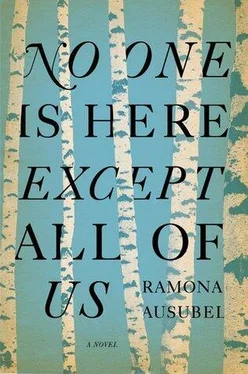Solomon sat down next to his father and mimicked the folded hands. He had no top hat, nor did he have a fresh black suit. He crossed his feet at the ankles and tried to be very patient.
“I was just trying to play,” he said. Igor nodded, unclear what the boy was talking about. “Dad?” Solomon asked. “I liked playing, even though I got hurt. I had fun.” Igor smoothed his son’s hair and leaned his own head on that warm globe.
“You are delightful,” Igor said, and he began to doze happily off. Solomon stayed as still as he could while his father snored softly, head on head.
The crowd outside dwindled as the hours passed. Around the little house, there was the glow of a cluster of candles, shaded by the hands of the stranger and a few of our most faithful old ladies. And then a voice never before heard in the world called out.
“Hey,” said Solomon to wake his father, “it happened. Time to go meet the baby.”
He gently rubbed the sand out of his father’s eyes and took his hand.
Inside, the new eyes were wide open.
“You see the world, don’t you?” I asked the squirming boy. I was spread flat out on the bed in my nightclothes, sweaty. My veins felt like they were ringing.
Igor put his hand out and said, “I am your father.” The baby did not reach for him but I took the tiny hand and placed it in his larger one. Igor smiled and shook. He sat down at the bedside where he patted his new son and me alternately.
Solomon came to the foot of the bed, saying, “I bless you, I bless you, I bless you.”
“Come here,” I said to my first son. “Are you all right?” He nodded. He looked perfect except for the small hole in his forehead, which had, at the healer’s direction, been filled with cobwebs.
The stranger awoke suddenly that night. In the corner of the moonlit barn she saw a dark shape. Immediately, her dream-heavy body was sure that the ghosts of the past had found her, and she prepared to be taken back to the old, burned-out world.
“All right, I’ll go,” she called. Her voice bounced from the hardwood of the walls. The shape jumped and scrambled. “Hello?” the stranger asked.
“What did you say?” the shape asked.
“I’ll come with you.”
“Oh, I was just checking for leaks,” the shape stammered.
“Leaks?” the stranger asked. Sleep softened, melted away, and the shape stood up from the place in the floorboards where the radio was hidden.
The jeweler came out from the corner and into the moonlight of the dusty window.
“I know about the hole in the floor,” she said quickly. “I know about the radio.”
“No. Oh, dear. Have you listened?” He fidgeted with the buttons of his jacket. He rubbed the back of his neck.
“No.”
“I am terrible. How could I have?” he asked. “I’m so sorry. I never meant you to know. No, no, no.” He punched himself in the temple. The stranger shook her head. Her outstretched hand was an invitation. Wordless, she opened the creaking barn door. The question of what she was doing appeared like a bubble. She popped it with an answer — loneliness. She knew the weight of knowing. Of feeling like the only one who knew, standing guard alone at the gate. Wind flapped the stranger’s white nightgown against her legs. They were an unlikely pair — she in her bedclothes kneeling in a patch of bloomless flower plants, digging — he, dressed for the day, his hair blown on end, crouched and waiting to see what she would unearth. Mudded, decomposed paper was born from the hole. Whatever words it had recorded were erased by the dirt and water.
“What is it?” the jeweler whispered, holding in his palm a handful of paper shreds, torn roots, earth.
“The mail,” the stranger told him. He pressed his thumb into the hand-warmed dirt.
“It never even occurred to me.” He trailed off.
“You wanted to believe.” The stranger picked bits of paper out, seeds from a lost species. She squeezed them together in a ball, tossed it back and forth between her hands.
“What did they say?” the jeweler asked.
“I wanted to believe, too. I never read them.” The stranger felt a sting for the single exception she had set sail, which she did not want to admit. The jeweler felt a sting, too: an orphan who finds himself full of questions about the past that have no answers in the living world. The other story was lost in the ground. The stranger placed the ball of paper back where it came from, then offered her empty, cupped palms, and the jeweler poured his burden in. She put the dark earth into the hole and began to fill it back up. The stranger patted the sealed wound. She scattered a few loose stones over it, and the jeweler thought how like a faraway graveyard it looked, the bodies of another place so distant their markers appeared no larger than pebbles.
Inside, the stranger lit a dozen candles by the side of her bed. Their light made the barn walls come alive with stars. She patted the spot on the bed next to her, which relaxed under the jeweler’s weight. The stranger felt her children, her husband, her own village reach out to her. Their memory filled her up — the empty space in her chest felt clogged and she coughed to clear it. She waited for a second before she asked the question she knew could unravel her life — all our lives. “What’s left of the old world?” The jeweler took her two hands into his. He held them to his chest and shook his head. His face was white, but the face of the moon outside the window was whiter still. She put her head on his shoulder and cried the names of everyone she had loved before into his shirt. Regret for allowing this sadness rolled through her chest. All the work, all the fierce belief, all the help the world had offered by sealing this land off, by keeping the sky clear of airplanes, by trusting the villagers in their invention — the stranger’s tears were a thousand promises broken.
“I don’t know if the other world is there,” the jeweler whispered. “I haven’t listened yet. I was so lonely at night I couldn’t stand it anymore. I just wanted some music.”
“You don’t know if there are terrible things?” He could not tell the stranger if there were or not. The soft moon and candlelight in the barn was so full of dust it was almost solid. The stranger swept her hand through it and watched the tiny particles fly away. She blew her nose into the handkerchief the jeweler offered to her. Sorrow sprouted leaves in the jeweler’s chest. Now that his secret was shared and he saw what it could do to another person, he regretted having saved this object.
“I should never have come back for it. I should never have saved it.”
“What if I want to listen?” she asked. He did not answer. His chest filled until it was tight, and he held that breath to make time stop.
“Why?” he asked finally.
“I could give you reasons. Because it might be the truth. Because it might not mean anything. Because I can protect us better if I know what’s coming. To test what we’ve made.” She paused. “Or none of those. Because here it is. Curiosity. Look at those dials, waiting to be turned.”
The jeweler did not try to convince her that he had truly only been wishing for music, that he was entirely unprepared for the possibility of news. “Can I say no?”
She shook her head. “Please don’t.”
In the darkest part of the night, when the owls and the wolves were the only animals looking for food, the stranger and the jeweler made a small nest of blankets and they turned on the dial that brought one world into another, that made a window in the wall the villagers had worked so hard to build. Before the sounds made any sense yet, the jeweler turned the radio off again. “I have something to say first,” he said, cracking his knuckles. “I love you. I have always loved you.”
Читать дальше












